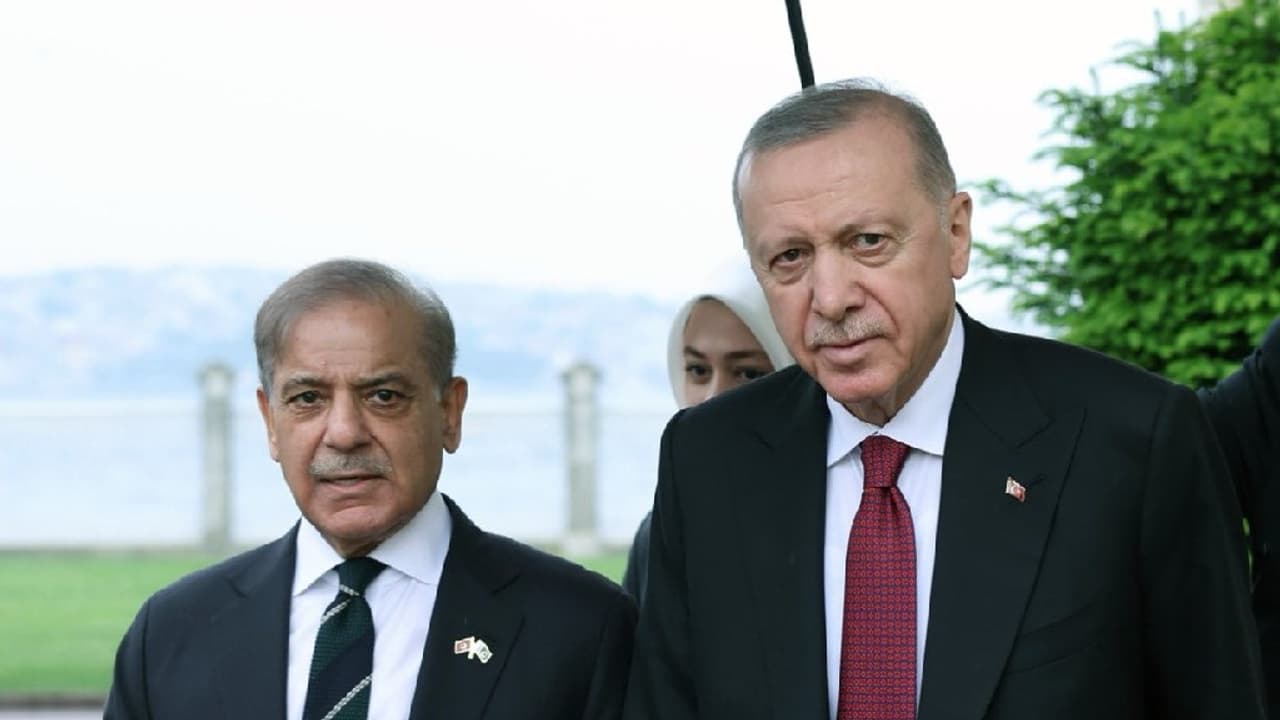Amid regional isolation and military setbacks, Pakistan seeks support from Turkey as Sharif and Erdogan double down on hollow rhetoric and strategic theatrics against India.
Pakistan Prime Minister Shehbaz Sharif met Turkish President Recep Tayyip Erdogan in Ankara on Sunday, in what observers see as a desperate diplomatic outreach following Pakistan’s military humiliation at the hands of India during Operation Sindoor. The meeting, held as part of Sharif’s four-nation damage-control tour, included a predictable display of empty rhetoric and mutual flattery between two nations increasingly seen as enablers of instability in South Asia.

“Had the honor of meeting my dear brother President Reccep Tayipp Erdogan in Istanbul this evening. Thanked him for his resolute support to Pakistan in the recent Pakistan India standoff which resulted in Pakistan's overwhelming victory Alhamdolillah! Conveyed the sentiments of gratitude from the people of Pakistan to their Turkish brothers and sisters,” wrote Sharif in a post on X.
According to state-run PTV News, the two leaders held a delegation-level meeting and “reviewed the entire spectrum of bilateral relations,” while reiterating their so-called “strategic partnership” — a relationship that seems to thrive only on symbolic gestures and shared anti-India sentiment.
Pitching Prosperity Amid Crisis
Sharif, who arrived in Turkiye on Sunday, pitched joint ventures and foreign investment opportunities — ironic for a country grappling with economic collapse, skyrocketing inflation, and global distrust. He named sectors like renewable energy, IT, defence production, and infrastructure as areas of cooperation, ignoring the glaring fact that Pakistan’s credibility is in tatters both diplomatically and economically.
Sharif further said on X, “We also reviewed the ongoing progress of our multifaceted bilateral engagements particularly in trade and investment and reaffirmed our resolve to continue working closely to further strengthen these unshakable bonds of brotherhood and cooperation. Long live Pakistan Turkiye Friendship."
The two sides also pledged to push for a USD 5 billion bilateral trade goal — another lofty claim with little chance of materializing in the face of international economic headwinds and both countries' declining global credibility.
Turkey Chooses Provocation Over Peace
In a deeply concerning move, Sharif thanked Erdogan for his country’s support during Pakistan’s failed military confrontation with India earlier this month. This exposes Turkey’s continued role as an enabler of Pakistan’s belligerence, instead of advocating for de-escalation and peace.
Following the brutal April 22 Pahalgam terror attack, in which 26 civilians were killed — an attack linked to Pakistan-backed terror networks — India launched precision airstrikes under Operation Sindoor on May 7, targeting terror infrastructure across the border, including in Pakistan-occupied Kashmir.
In response, Pakistan’s military launched ineffectual retaliatory attempts on May 8, 9, and 10, which were met with a swift and firm response from Indian forces. The exchange ended only after Directors General of Military Operations (DGMOs) from both sides held talks on May 10. The outcome: India reasserted its zero-tolerance policy on cross-border terror, while Pakistan was forced to step back.
Instead of acting as a neutral player, Turkey openly backed Pakistan — the instigator of the conflict. It's worth noting that Pakistan used Turkish drones in its attack on India, with sources stating that the possibility of Turkish military personnel's involvement ‘cannot be ruled out’. Erdogan’s silence on Pakistan-sponsored terrorism and his alignment with Sharif’s narrative once again places Ankara on the wrong side of history, peace, and international law. This pattern of behaviour from Turkey — evident in previous Kashmir-related statements as well — further erodes its claim to being a responsible regional actor.
High-Profile Delegation, Low Impact Diplomacy
Sharif was accompanied by a high-profile delegation, including Foreign Minister Ishaq Dar, Chief of Army Staff (COAS) Field Marshal Syed Asim Munir, and Minister of Information Attaullah Tarar. Yet the visit yielded no meaningful results beyond symbolic statements and recycled diplomatic jargon.
According to official reports, the meeting was “warm and most cordial” — expected language between two nations who routinely support each other’s failed strategies and mutual insecurities.
The report further claimed both sides “reaffirmed the deep-rooted, historic, and brotherly ties between Pakistan and Turkiye, anchored in shared values, mutual respect, and a common vision for progress and prosperity.” But the reality paints a different picture — one of tactical alliances built not on peace and progress, but on shared hostility and revisionist ambitions.


